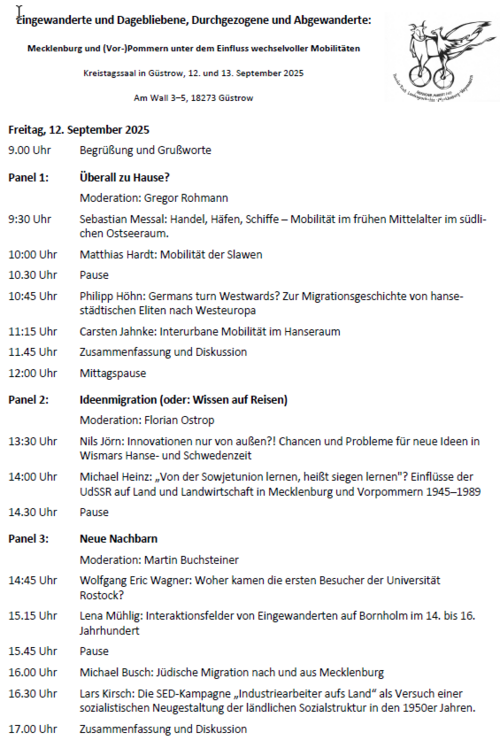Mobilities, movements of people, things and knowledge, are a significant factor of change and have also shaped the population in the area of today's federal state of Mecklenburg-Vorpommern for centuries. Mobile subjects with different social, cultural and religious backgrounds challenged established norms and behaviors and provoked reactions from the locals. This required both sides to adapt, reorganize and reorient themselves, and led to socio-spatial changes in rural areas, villages and cities. Mobile objects, practices and bodies of knowledge encountered existing ones, were either accepted or rejected, reinterpreted and functionally changed. The aim of the conference is to identify and analyze such transformations, which occur as a result of mobility, with regard to the historical inhabitants of Mecklenburg and (pre-)Pomerania and to explore their effects on regional identities.
Friday, September 12, 2025
9.00 a.m. Welcome and greetings
Panel 1: At home everywhere?
Moderation: Gregor Rohmann
9:30 a.m. Sebastian Messal: Trade, ports, ships - mobility in the early Middle Ages in the southern
Baltic Sea region.
10:00 a.m. Matthias Hardt: Mobility of the Slavs
10:30 a.m. Break
10:45 a.m. Philipp Höhn: Germans turn Westwards? On the migration history of Hanseatic city
elites to Western Europe
11:15 a.m. Carsten Jahnke: Interurban mobility in the Hanseatic region
11.45 a.m. Summary and discussion
12:00 p.m. Lunch break
Panel 2: Migration of ideas (or: knowledge on the move)
Moderation: Florian Ostrop
13:30 Nils Jörn: Innovations only from outside?! Opportunities and problems for new ideas in
Wismar's Hanseatic and Swedish era
14:00 Michael Heinz: “Learning from the Soviet Union means learning to win”? Influences of the
USSR on land and agriculture in Mecklenburg and Western Pomerania 1945-1989
14.30 Break
Panel 3: New neighbors
Moderation: Martin Buchsteiner
14:45 Wolfgang Eric Wagner: Where did the first visitors to the University of Rostock come from?
Rostock?
15.15 Lena Mühlig: Fields of interaction of immigrants on Bornholm in the 14th to 16th centuries.
century
15.45 Break
16.00 hrs Michael Busch: Jewish migration to and from Mecklenburg
16.30 hrs Lars Kirsch: The SED campaign “Industrial workers to the countryside” as an attempt at a
socialist reorganization of the rural social structure in the 1950s.
17.00 Summary and discussion
Translated with www.DeepL.com/Translator (free version)
Saturday, September 13, 2025
Panel 4: Involuntarily mobile
Moderation: Michael Heinz
09:30 Matthias Asche: Frenchmen in Mecklenburg and Pomerania in the 18th century
- Huguenot immigration in Bützow, Stettin and Pasewalk
10:00 Jakob Schwichtenberg: Baltic German refugees in Mecklenburg in the 20s and 30s
and 30s
10:30 a.m. Break
10:45 a.m. Elmar Koch: War graves
11.15 a.m. Florian Ostrop: Deported, detained, unwanted: Forced labor and displaced persons in Mecklenburg
Displaced Persons in Mecklenburg (1939-1945)
11:45 a.m. Summary and discussion
12:00 p.m. Lunch break
Panel 5: In the eyes of the 'others'
Moderation: Wolfgang Eric Wagner
13:30 Reno Stutz: Dealing with the “stranger” in Mecklenburg
14:00 Karin Ritthaler-Praefcke/Ulrike Stern: Low German, High German and Polish.
Carl August von Pentz - life and writing in a triad
14:30 Break
14:45 Gregor Rohmann: Violence and elite migration in Northern Europe in the
Late Middle Ages
15.15 hrs David Vollmuth: Everything typical or what? - Migration in the plant world
Mecklenburg-Western Pomerania and its effects on landscapes as
identity
15:45 Summary and discussion
16:00 Closing remarks

